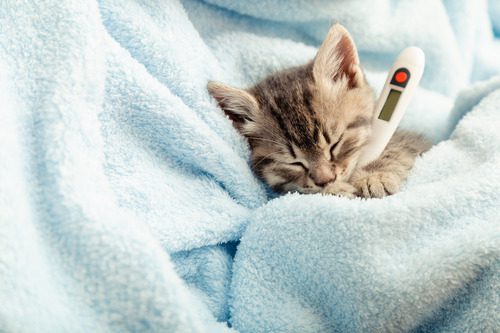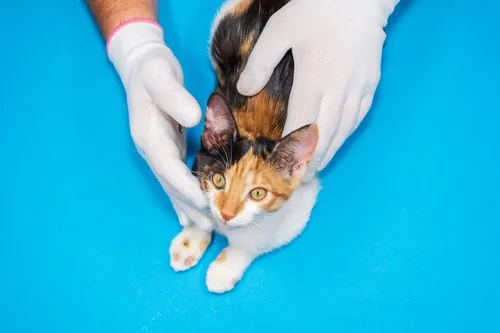
Can Cats Catch the Flu?
Seasonal illnesses often raise questions among pet owners, especially when symptoms like sneezing, coughing, and runny noses appear in their cats. One of the most frequently asked questions this time of year is: can cats catch the flu? While the flu may seem like a human problem, certain strains of the influenza virus can affect animals, including cats. In a city like Boston, where households often include multiple people and pets, understanding how illness may spread between species helps protect everyone in the home. Let’s take a closer look at how feline influenza works, how it spreads, and what signs to watch for.

What Is Feline Influenza?
Feline influenza, often referred to as cat flu, is a respiratory illness that affects cats. When people ask, “can cats catch the flu?” they usually want to know whether the influenza virus we get can be passed to cats. The answer depends on the type of flu in question. Cats are susceptible to some strains of influenza A, including H1N1 and H5N1. While rare, these strains can pass from humans to cats and even from birds to cats, usually through close contact.
Most cases of “cat flu,” however, refer to upper respiratory infections caused by feline-specific viruses like feline herpesvirus (FHV) and feline calicivirus (FCV). Though not technically “the flu,” these illnesses cause flu-like symptoms in cats and often lead pet owners to wonder whether their cat has the same flu they do. These infections are highly contagious between cats, especially in shelters, boarding facilities, or multi-cat households.
How Do Cats Catch the Flu?
When discussing whether cats can catch the flu, it’s helpful to understand how these infections spread. Transmission happens through direct contact with an infected animal, contaminated surfaces, or through the air via respiratory droplets.
Human-to-Cat Transmission
In the case of influenza A, a person infected with the flu could theoretically transmit the virus to their cat if the strain is one that can jump species. This type of flu transfer is relatively uncommon but has been documented. For example, during the 2009 H1N1 outbreak, several cases of human-to-cat transmission were confirmed in the U.S.
Cat-to-Cat Transmission
For upper respiratory infections caused by feline-specific viruses, the spread is much more common. Cats can catch these viruses by sharing food and water bowls, grooming each other, or being exposed to an environment where an infected cat has been. Kittens, senior cats, and those with weakened immune systems are more vulnerable. If you suspect your cat may have been exposed, contact Back Bay Veterinary Clinic to schedule an exam.
Symptoms to Watch for in Cats with Flu-Like Illness
If your cat appears under the weather, it’s natural to wonder, can cats catch the flu from people or other animals? Paying attention to the symptoms can help guide your next steps. Cats experiencing flu-like illnesses may display a range of signs, depending on the specific virus and the severity of the infection. Common signs of feline flu or upper respiratory infection include:
- Sneezing or nasal discharge
- Coughing
- Fever
- Eye discharge or conjunctivitis
- Lethargy or reduced activity
- Loss of appetite
- Difficulty breathing
While many of these signs resemble symptoms seen in people with the flu, they may not always indicate influenza. Other infections, including bacterial ones, can cause similar symptoms. Because some of these illnesses can lead to complications, it’s best to have your cat evaluated promptly. Call Back Bay Veterinary Clinic at (617) 247-2273 to schedule a visit if you notice any of these changes.
Can Cats Catch the Flu from Humans?
One of the more concerning questions pet owners ask is whether cats can catch the flu from people. In rare instances, the answer is yes. Certain strains of the flu, such as H1N1 and H5N1, have been known to jump from humans to cats. Transmission typically happens through close contact, like cuddling or sharing living spaces during an active infection. Although this kind of transmission is not the norm, it underscores the need to limit contact with your cat when you’re sick. Wash your hands before and after handling your pet, and avoid close contact until you’re feeling better. While the risk of transmission remains low, minimizing exposure is a good precaution. If someone in your home has the flu and your cat begins to show respiratory symptoms, let your veterinarian know as soon as possible. The team at Back Bay Veterinary Clinic can evaluate whether testing is needed and help determine the best next steps.
Diagnosing Flu-Like Illnesses in Cats
Veterinarians use a combination of clinical signs, physical exams, and diagnostic testing to determine whether a cat has caught the flu or another type of infection. Since several different viruses can cause similar symptoms, testing helps pinpoint the source. Your veterinarian may recommend:
- Bloodwork
- PCR testing to identify specific viruses
- Chest X-rays to check for pneumonia or other complications
- Eye or nasal swabs
The results of these tests guide the care plan. Whether the illness is due to a feline-specific virus or a zoonotic flu strain, your veterinarian will advise on supportive care and next steps to help your cat recover. Never attempt to diagnose or treat respiratory illness at home. Instead, reach out to Back Bay Veterinary Clinic for professional guidance.
How to Help Prevent the Flu in Cats
While it’s not always possible to prevent flu-like illness entirely, there are several ways to reduce your cat’s risk.
- Vaccinations can help protect against feline herpesvirus and calicivirus, which are responsible for most cat flu cases.
- Keeping your cat indoors can also limit their exposure to other sick animals. If your cat must interact with other animals, such as during grooming, boarding, or adoption events, ask whether those facilities require vaccinations.
- Good hygiene practices, including cleaning shared bowls and litterboxes regularly, also help.
- If you or anyone in your household comes down with the flu, try to limit contact with your cat until you’re no longer contagious. Although it’s rare, cats can catch the flu from humans, and it’s best to avoid unnecessary exposure.
If you’re concerned about your cat’s health, please call Back Bay Veterinary Clinic at (617) 247-2273.
When to Call Your Veterinarian
Knowing when to involve your veterinarian can make a difference in how quickly your cat recovers. If your cat shows signs of illness for more than a day or two, or if symptoms worsen, schedule an appointment. Flu-like illnesses can escalate quickly, especially in kittens and senior cats. Don’t wait to see if symptoms improve on their own. Early evaluation allows your veterinarian to determine whether further testing or supportive care is needed. Cats with persistent coughing, nasal discharge, fever, or lethargy should be seen promptly. For questions or to book an appointment, call Back Bay Veterinary Clinic at (617) 247-2273.









